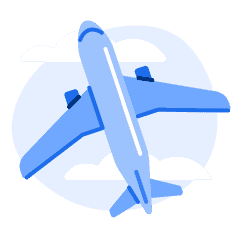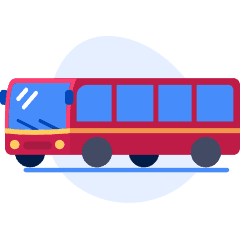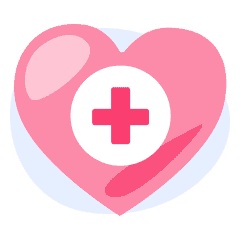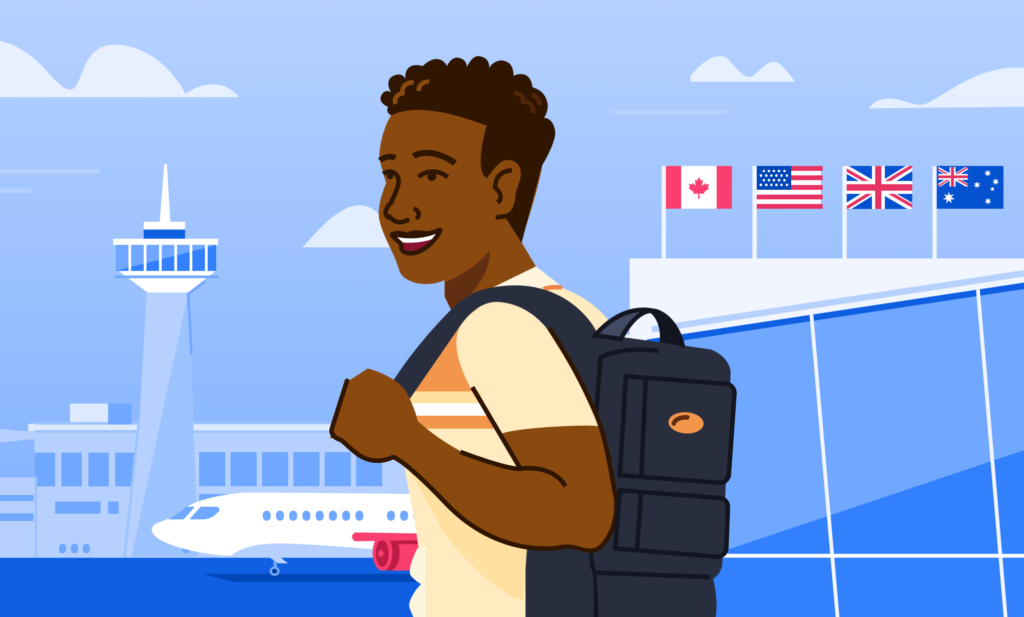Once you’ve finally landed in your destination country, it’s an exciting feeling after months of hard work and preparation. Arriving at your new home comes with its own unique set of to-dos. To help fast-track your student journey, we’ve created an arrival guide to help simplify the process once you land.

Wondering what you need before arriving at your destination country? This pre-arrival checklist can help students prepare for what to expect upon arrival.

The Interview
First things first: when arriving in your destination country, you’ll need to speak with a government official to discuss the purpose of your visit and what your plans are. Depending on the country, they may ask for documentation such as:
- Valid travel authorization
- Letter of Introduction/Reference (from your visa application)
- Financial documents (proving you have enough money for your stay)
- Valid immigration medical results
- Proof of vaccination
Tip: A helpful tip to keep these documents accessible is to put them in your bag or carry-on instead of packing them in your luggage.
For some helpful tips on how to pass your visa interview in Canada, the US, and the UK, check these articles out.

Transportation
Next up is transportation. Specifically, how do you plan on getting around? When leaving the airport, you have a few options:
Airport Taxi Services
Most airports have taxi services that wait for people exiting the airport terminal, making this a popular option. Taxi fare varies, depending on your destination To calculate your taxi fare, this website can help give you a rough estimate.
Note: Only use authorized taxi providers. To be sure, visit your airport’s website for more information.
Uber/Lyft
Uber and Lyft provide transportation services from their respective apps. Their prices are usually cheaper than taxi providers and offer a range of benefits compared to a traditional taxi, such as faster service, a set price, and GPS instructions.
Note: When ordering an Uber/Lyft, ensure you get a message from the app with information about your driver, so you can confirm the make, model, and license plate of their vehicle for safety purposes.
Public Transportation
Using public transportation may be a good idea if you’ll be living close to the airport. Visit your airport’s website to find more information about available public transportation, or download a local public transit app to help you get where you’re going. However, if you live further away and you arrive later in the evening, it’s recommended you take a taxi, Uber, or Lyft instead.
Note: Bring a face-covering with you when taking public transportation, depending on the mask mandates in the country you’re visiting.
Want to adventure around Australia, Canada, the United Kingdom, or the United States while studying abroad? Check out some top tips on how to do so without breaking the bank!

Essentials, Essentials, Essentials!
Once you’re settled into your campus or living space, it’s time to make a list of essentials you’ll need during your stay. First, look up nearby grocery stores, restaurants, and shopping areas. Then make a general list of basic necessities, such as food and cooking equipment, cleaning supplies, and emergency items.
Some tips to keep in mind when shopping for essentials include:
- Check for stores close to your living area to reduce transportation costs. Many institutions have essential stores built into their campus for students.
- Choose stores with affordable prices.
- Choose no-name products over brand names to save money.
Want to eat healthy without breaking the bank? This article offers some great tips on eating healthy on a student budget!

Get to Know Your Campus
Before you start attending your classes, it’s always a good idea to scope out your campus. Attending Orientation Day is highly recommended, as you’ll learn where to access basic services, meet new friends, and have opportunities to ask faculty, staff, and students all of your questions.
It’s important to know the following:
- Where to access banking and ATM machines on campus
- Emergency numbers (local police and campus security)
- The location of the nearest hospitals and medical clinics
- Important dates and locations for enrollment
- Student discounts you’re entitled to
Want to learn more about Orientation Day? This article explains what it is and what to expect.

Apply for Services
Depending on what’s available in your destination country, it’s recommended you apply for the following services.
Medical Services
Health and travel insurance provides international students and their families with peace of mind. Keep in mind that policies and requirements differ, depending on a student’s visa.
Find information on applying for health and travel insurance in Australia, Canada, the UK, and the US.
Social Security Number
A social security number is important, as you’ll usually need one to open a bank account, have a part-time job, or access government programs or benefits. Check your destination country’s official website to learn more and apply.
Bank Account
There will be multiple banks to choose from in your destination country. Do your research and check for banking institutions offering international students deals or perks. It’s recommended you set up both a chequing and savings account for day-to-day banking.
For more information on banking in Canada or the US, check out our blogs on how to open a student bank account.
Cell Phone
Now more than ever, cell phones are an essential everyday need. Stay connected with others by researching your options and choosing a cell phone plan. Consider smaller providers for lower costs, with contracts of two to three years that include a cellular device, calling minutes, and data in your plan.

Make Connections
Making connections will make your study abroad experience all the more enjoyable, and can open up doors to wonderful opportunities!
Make new connections by:
- Attending orientations
- Connecting through social media
- Joining clubs
- Exploring your city
Check this article out to learn more about making friends while studying abroad!
When first landing in your destination country, it can feel overwhelming having so much to do—but with enough research and knowledge, you’ll be set on your way! Use this article as a guide to help you navigate your study abroad journey.






